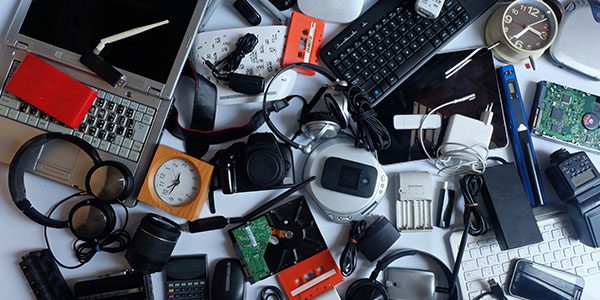R2 Certification Electronic Devices Recycling: Your Assurance for Responsible Disposal
R2 Certification Electronic Devices Recycling: Your Assurance for Responsible Disposal
Blog Article
Elevate Your E-Waste Management With R2 Accreditation: a Detailed Overview
One key approach to boost e-waste management methods is by attaining R2 accreditation. By exploring the processes and benefits associated with R2 certification, a deeper understanding of just how it can reinvent e-waste administration approaches emerges, losing light on a path in the direction of sustainability and honest disposal techniques.
Significance of E-Waste Management

When e-waste is not handled correctly, these harmful compounds can leak right into the environment, creating harm to wild animals and possibly going into the food chain, posing risks to human health and wellness. The inappropriate disposal of e-waste contributes to pollution and greenhouse gas exhausts, aggravating environment adjustment and environmental degradation.

Benefits of R2 Accreditation

To start with, R2 certification enhances credibility by showcasing an organization's devotion to sustainable practices. It guarantees customers, partners, and stakeholders that the business follows strict requirements for e-waste monitoring - r2 certification. This reputation can cause raised depend on and improved relationships with clients that prioritize ecological duty
Second of all, R2 qualification helps mitigate threats connected with improper e-waste disposal. By adhering to the rigorous guidelines set forth by the certification, organizations can lessen the probability of information violations, environmental contamination, and legal effects. This positive strategy safeguards the firm's reputation and minimizes prospective obligations.
Finally, R2 qualification shows a dedication to environmental stewardship - r2 certification. By responsibly managing digital waste via accredited processes, organizations add to the conservation of resources, reduction of contamination, and promotion of a round economic climate. This commitment not only benefits the atmosphere yet additionally aligns with progressing customer assumptions for lasting company methods
R2 Qualification Refine Introduction
Having actually developed the advantages of R2 accreditation in advertising integrity, danger mitigation, and environmental stewardship, it is vital to now detail the in-depth process included in getting this accreditation. The R2 certification procedure starts with a comprehensive testimonial of the organization's functional policies and procedures to make sure conformity with the R2 standard. This initial evaluation is critical in identifying any type of gaps that need to be resolved prior to continuing even more.
When the organization's techniques straighten with the R2 basic demands, an independent third-party auditor performs an on-site audit to evaluate the execution and effectiveness of these techniques. This audit consists of an extensive review of documents, meetings with personnel, and physical inspections of centers to validate compliance.
Adhering to a successful audit, the organization gets an accreditation choice based upon the auditor's findings. If authorized, the organization is approved R2 certification, showing its dedication to accountable e-waste monitoring. It is essential to note that maintaining R2 certification needs recurring conformity with the standard's demands and periodic audits to guarantee ongoing adherence to finest practices in e-waste recycling and disposal.
Key Criteria for R2 Compliance
An important facet of achieving R2 conformity is ensuring that all digital waste (e-waste) handling centers fulfill stringent environmental and safety and security criteria. To abide by R2 requirements, companies have to abide by vital standards that focus on responsible e-waste monitoring practices. These standards consist of implementing a recorded environmental, health and wellness, and security monitoring system, ensuring the Read Full Article secure handling of data-containing devices, and conducting detailed downstream due diligence to track the last location of e-waste materials.
Furthermore, R2 conformity necessitates the proper testing, refurbishment, and recycling of digital equipment to prolong its beneficial life and lessen ecological effect. Facilities seeking R2 accreditation have to also focus on worker wellness and security by providing needed training, personal protective devices, and a safe working environment. In addition, maintaining detailed records of e-waste processing tasks and routinely undertaking audits by click for more info accredited accrediting bodies are important components of showing continuous conformity with R2 requirements.
Influences of Sustainable E-Waste Practices
The implementation of lasting e-waste practices according to R2 conformity not only makes sure environmental and safety standards are fulfilled yet likewise dramatically influences the general lifecycle of digital items. By sticking to R2 standards, electronic waste management processes end up being more efficient, lowering the environmental impact of digital products. Lasting e-waste methods help with the appropriate disposal of digital parts, ensuring that dangerous materials are dealt with properly and do not finish up contaminating the setting.
In addition, sustainable e-waste practices can add to job development in the recycling and refurbishment fields, promoting financial development while promoting environmental duty. Generally, the adoption of sustainable e-waste methods under R2 certification offers as a vital action in the direction of accomplishing an extra ecologically sustainable electronics market.
Verdict
Finally, implementing correct e-waste monitoring practices is essential for environmental sustainability and source conservation. R2 certification plays a crucial role in guaranteeing liable handling and disposal of digital waste. By adhering to the strict standards set forth by R2 requirements, organizations can not only lessen their environmental effect however additionally add to a much more lasting future for generations to come.
One key approach to boost e-waste management techniques is by acquiring R2 browse around this web-site certification. By discovering the processes and advantages linked with R2 accreditation, a deeper understanding of how it can revolutionize e-waste monitoring approaches arises, shedding light on a path towards sustainability and ethical disposal techniques.
The R2 certification process begins with a detailed evaluation of the organization's functional plans and procedures to guarantee conformity with the R2 requirement. If authorized, the organization is granted R2 certification, demonstrating its dedication to responsible e-waste management. Generally, the adoption of lasting e-waste techniques under R2 accreditation serves as an important step towards attaining a more eco sustainable electronics industry.
Report this page